The comprehensive off-road 4x4 test, comparing everythign from the Ford Ranger XLT against the Mitsubishi Triton GLS or the Ssangyong Musso
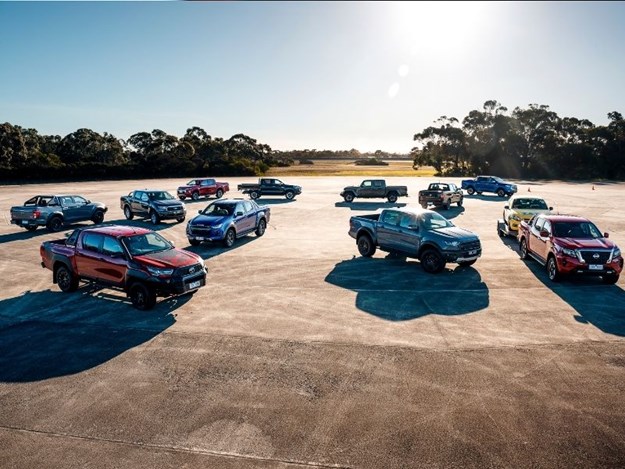 |
Four-wheel drives are meant to be used off-road, so a comprehensive off-road test loop was devised to see which dual-cab ute was the most capable in low-range 4×4. This test course was made up of mud, steep hill climbs and descents, rutted out wombat holes and a water crossing as well as some faster corrugations to gain an understanding of how each ute held together over traditional Australian off-road terrain.
This was an accurate representation of what we feel most dual-cab owners will be putting their own vehicles through. It is also a back-to-back comparison designed to highlight any shortcomings or highlights of each 4×4.
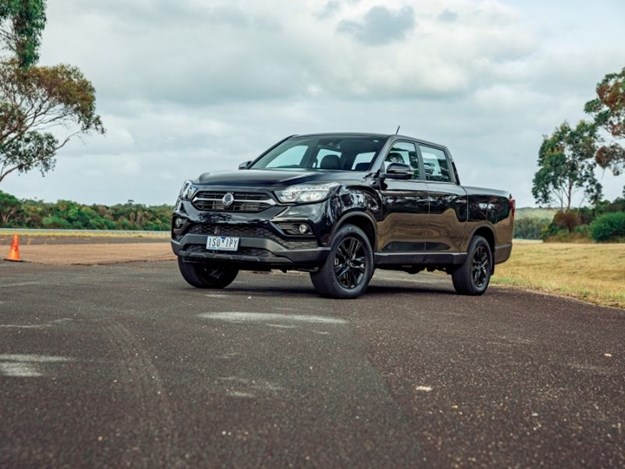 |
Ssangyong Musso Unlimited XLV – 5/10
The Musso struggled in the off-road test, due mainly to a lack of ground clearance. It bottomed out more than any other ute, and was the only ute that didn’t make it up our steep test climb the first time.
Thankfully, there are aftermarket suspension lift kits available to fix this. It also has an automatic rear diff lock rather than a selectable one, which isn’t as practical as being able to manually activate the locker when required.
Low-range gearing was also a weak point, having to rely on hill-descent control to come back down our steep test hill, which worked fairly well. The engine feels really peaky too, making smooth progress more difficult than others on test.
 |
GWM Ute Cannon-L – 5.5/10
I was very excited to take the GWM Cannon off-road, but that excitement didn’t last long. The gear selector was a particular annoyance as it’s overcomplicated and not what you want in a 4×4 where quick shifts from drive to reverse are required. It was also slow to engage 4×4, which is not ideal.
Thankfully, traction control response seemed adequate and it was able to get through our test course, just not as easily as other utes thanks to the poor ramp-over angle. Hill-descent control worked well, and when combined with the rear selectable locker, mild off-roading is within its realms.
As a side note, and we’re still not sure what happened here, but the Cannon was making some awful clunks and bangs from the rear-end when making tight turns in our off-road test. The radio also decided it didn’t want to turn off, requiring the vehicle to be switched off and back on again.
.jpg) |
Mitsubishi Triton GLS – 7/10
The first thing you notice about the Triton off-road is how nimble it is thanks to the shorter wheelbase and narrower dimensions. It’s also packed with clever off-road features, such as Super Select which allows you to run in 4×4 high range (with centre differential unlocked) on-road.
There are also various terrain modes available including rock, gravel, mud/snow and sand. Combined with the rear differential lock, and decent traction control system, the Triton went everywhere we wanted it to go.
4×4 engagement did take a few turns to get locked in, and the low-hanging rear differential vibration damper did touch down on a few occasions. Suspension travel in the front end is also limited and the brakes suffered after driving through heavy mud. Otherwise, it felt like a little tractor in a good way.
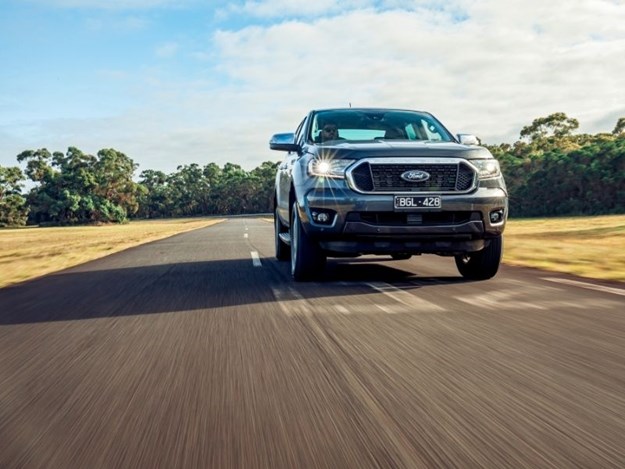 |
Ford Ranger XLT Bi-Turbo – 8/10
First impressions when driving the Ranger XLT off-road are how planted it is. The suspension is well-suited to undulations and is compliant when the going gets tough. 4×4 engagement was quick and easy, however, we did catch on the low factory side steps a few times.
Steering and brakes felt excellent, and gearing options available from the 10-speed transmission made it feel like there was a ratio for any situation. The motor felt torquey when combined with said gearbox but from experience we know the older 3.2 offers more low-down grunt off-road. My main gripe is that the traction control isn’t as good off-road as the Hilux; it’s good but not Hilux good. And that is being really critical.
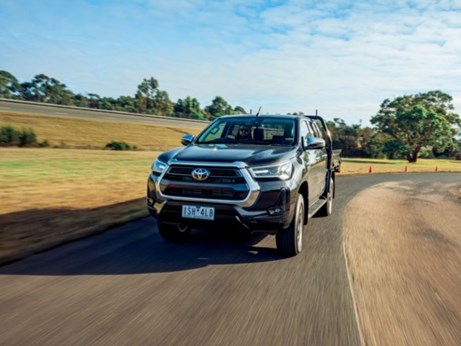 |
Toyota Hilux SR5 – 8.5/10
Compared to the Ford Ranger, the SR5 Hilux definitely rode firmer on rough terrain. The steering also felt heavier, but not by much. As per the Rugged X, the traction control system found in the Hilux is nothing short of amazing off-road.
The second you feel a tyre slip, it stops it and sends drive to the tyre with grip. Gearing is also sensational, providing plenty of pulling power up hills and wonderful engine braking down them.
4×4 engagement was quick and easy, with no real annoyances to mention. This platform has been around a few years now and with this most recent update, Toyota have in my opinion created the most capable Hilux yet. It’s a brilliantly effective 4×4, even in stock trim.
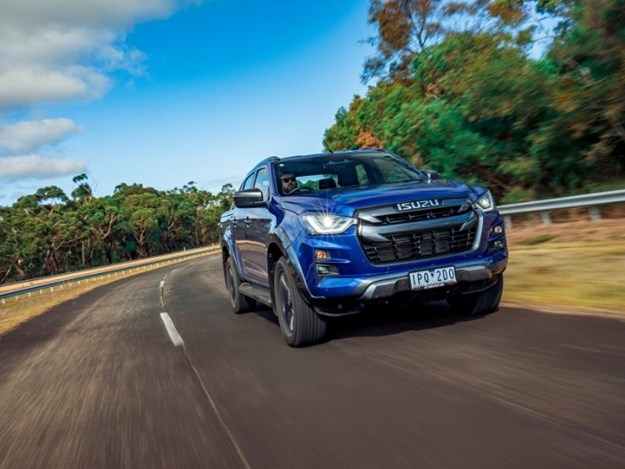 |
Isuzu D-Max X-Terrain – 7/10
The heart of any D-Max is the engine offered, and I found the low-down torque from Isuzu’s 3.0L motor to be perfectly suited to the gearbox. While the traction control system found in the D-Max isn’t Hilux good, you are able to coax every last inch of grip from the tyres by using the low-down lazy power to your advantage.
Like the Triton, it feels tractor-like in a good way. The suspension offers decent – not best-in-class – wheel travel but rode firmly over undulations when unladen. It was great to see a rear differential lock fitted to the D-Max, as it dramatically improves off-road capability over the previous generation.
4×4 engagement was smooth and really easy via a simple rotary dial and when locked in low range, engine braking was slow and controlled on descents.
.jpg) |
Nissan Navara ST-X – 7.5/10
While the suspension in the Navara felt soft when towing, it was at home on our off-road test track. Soft and flexible, which just what you want. The available gearing was also sensational, seeing the Navara crawling down steep slopes at a snail’s pace.
At no stage did it bottom out either, and we tried our best to unsettle it. Heavy steering was again a letdown, although this is something you’d naturally get used to. 4×4 activation wasn’t smooth sadly, requiring a few attempts to get it into low range, but when it was locked in, the Navara performed well off-road with a competent traction control system getting power to the ground. I see the Navara as a bit of an underdog and feel that with a suspension upgrade, it would be a handy off-road performer.
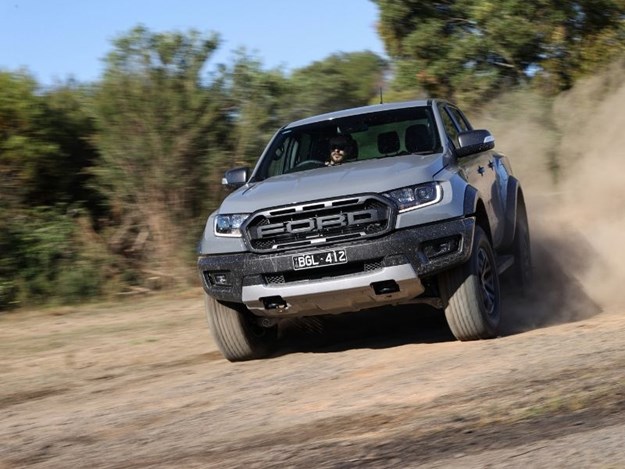 |
Ford Ranger Raptor – 8.5/10
The very first thing you notice about the Ranger Raptor is how wide it is. We drove the Raptor second last out of the field, and it simply didn’t want to sit in the wheel tracks carved out by 4x4s we’d already tested.
Engaging low-range 4×4 was simple and easy, with various traction control modes to play with depending on the terrain you are driving. Special mention must go to the seats, with those supporting side bolsters holding you in place no matter how rough the terrain.
Speaking of rough terrain, the Raptor’s suspension ate washouts for breakfast. This was by far the fastest vehicle through the test course, without even trying. Traction was great thanks to the BFG all-terrains but in terms of pure 4×4 ability, it’s not the most capable here. It’s still very accomplished though, and was an absolute hoot to drive.
Jeep Gladiator Rubicon – 9/10
In terms of pure off-road prowess, you’d be hard-pressed to find a more capable vehicle than the Gladiator. Front and rear locking differentials, tremendous low-range gearing, a disconnecting front sway bar and mud terrain tyres are a recipe for success.
And while the Ford Ranger Raptor felt wide on the tracks, the Gladiator felt long. This was its only real issue during our testing. Some larger tyres and a bit of suspension lift will fix this. I swear the Gladiator in Rubicon trim didn’t slip a wheel the entire time; traction levels were simply incredible.
4×4 engagement was via a simple old-school lever, which was great to see, and the interior – while cramped – is easy to clean after a day on the tracks. So, while not perfect, with a few simple tweaks the Jeep Gladiator Rubicon would be unstoppable off-road.
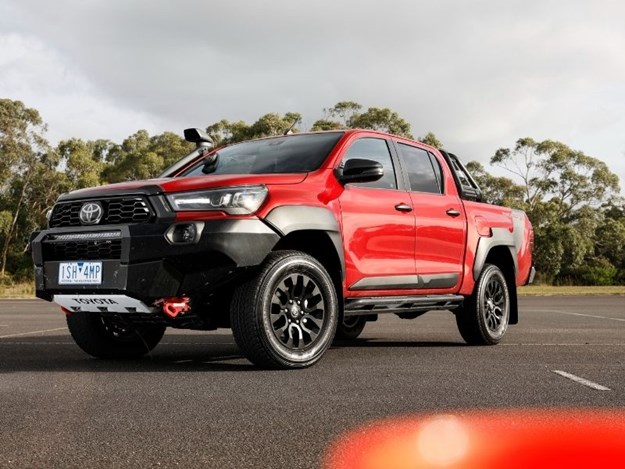 |
Toyota Hilux Rugged X – 8.5/10
I’m a fan of the factory accessories fitted to the Rugged X, especially the rock sliders that work really well. It must be said though, I’ve never seen a vehicle that is more of a candidate for larger tyres than the Rugged X. It’s begging for them! That’s its only letdown off-road.
As expected, the traction control system found in the Hilux range is first class, pulling the Hilux through everything even on its small highway terrain tyres. 4×4 activation was quick and easy, with excellent low-range gearing available.
With a bigger set of tyres and a basic suspension lift, you’d have a practical ute day-to-day and a capable 4×4 for the weekends. That’s all it needs really, thanks to the factory fitted bar work and recovery points.
.jpg) |
Mazda BT-50 Thunder – 7/10
The BT-50 Thunder from Mazda is a more lifestyle orientated ute, however, when you look past the steel bull bar and flares fitted, it is essentially a D-Max. Which is a good thing. As per the D-Max, traction control wasn’t top of the field but the rear diff lock made up for any shortcomings.
The revered 4JJ3 3.0L motor produces torque down low where you want it, allowing for smooth and easy going when negotiating rough terrain. The suspension does feel firm as per the D-Max, and is something I’d personally be upgrading if I was in the market. 4×4 engagement is simple and effective, grabbing low-range the first time (as it should).
Photography: Ellen Dewar, Alastair Brook and Cristian Brunelli

